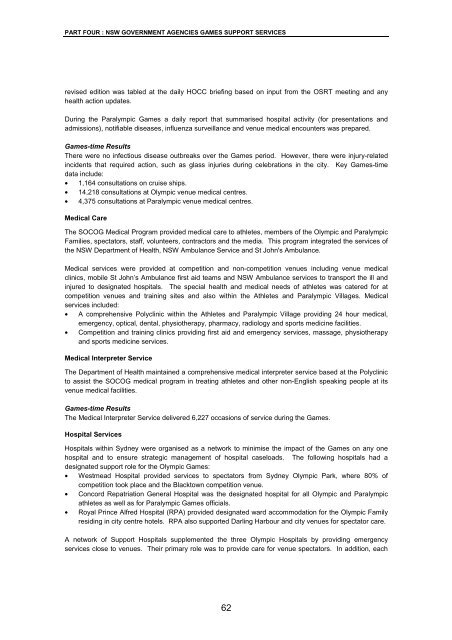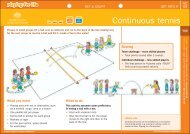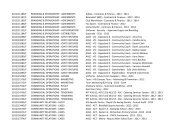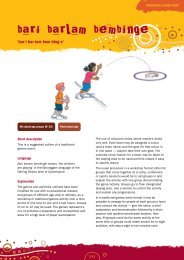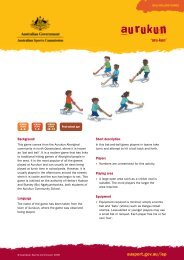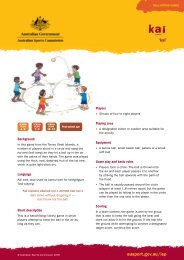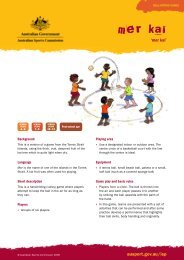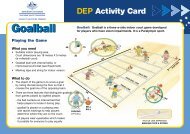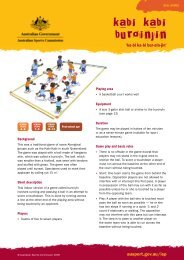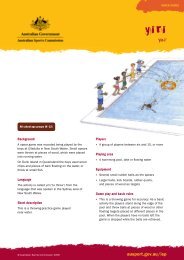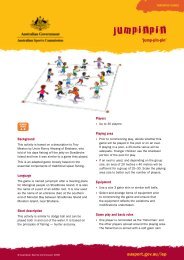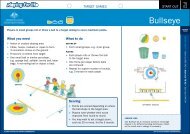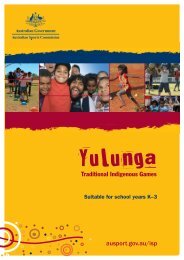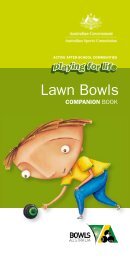the sydney 2000 olympic and paralympic games - Australian Sports ...
the sydney 2000 olympic and paralympic games - Australian Sports ...
the sydney 2000 olympic and paralympic games - Australian Sports ...
Create successful ePaper yourself
Turn your PDF publications into a flip-book with our unique Google optimized e-Paper software.
PART FOUR : NSW GOVERNMENT AGENCIES GAMES SUPPORT SERVICES<br />
revised edition was tabled at <strong>the</strong> daily HOCC briefing based on input from <strong>the</strong> OSRT meeting <strong>and</strong> any<br />
health action updates.<br />
During <strong>the</strong> Paralympic Games a daily report that summarised hospital activity (for presentations <strong>and</strong><br />
admissions), notifiable diseases, influenza surveillance <strong>and</strong> venue medical encounters was prepared.<br />
Games-time Results<br />
There were no infectious disease outbreaks over <strong>the</strong> Games period. However, <strong>the</strong>re were injury-related<br />
incidents that required action, such as glass injuries during celebrations in <strong>the</strong> city. Key Games-time<br />
data include:<br />
• 1,164 consultations on cruise ships.<br />
• 14,218 consultations at Olympic venue medical centres.<br />
• 4,375 consultations at Paralympic venue medical centres.<br />
Medical Care<br />
The SOCOG Medical Program provided medical care to athletes, members of <strong>the</strong> Olympic <strong>and</strong> Paralympic<br />
Families, spectators, staff, volunteers, contractors <strong>and</strong> <strong>the</strong> media. This program integrated <strong>the</strong> services of<br />
<strong>the</strong> NSW Department of Health, NSW Ambulance Service <strong>and</strong> St John's Ambulance.<br />
Medical services were provided at competition <strong>and</strong> non-competition venues including venue medical<br />
clinics, mobile St John’s Ambulance first aid teams <strong>and</strong> NSW Ambulance services to transport <strong>the</strong> ill <strong>and</strong><br />
injured to designated hospitals. The special health <strong>and</strong> medical needs of athletes was catered for at<br />
competition venues <strong>and</strong> training sites <strong>and</strong> also within <strong>the</strong> Athletes <strong>and</strong> Paralympic Villages. Medical<br />
services included:<br />
• A comprehensive Polyclinic within <strong>the</strong> Athletes <strong>and</strong> Paralympic Village providing 24 hour medical,<br />
emergency, optical, dental, physio<strong>the</strong>rapy, pharmacy, radiology <strong>and</strong> sports medicine facilities.<br />
• Competition <strong>and</strong> training clinics providing first aid <strong>and</strong> emergency services, massage, physio<strong>the</strong>rapy<br />
<strong>and</strong> sports medicine services.<br />
Medical Interpreter Service<br />
The Department of Health maintained a comprehensive medical interpreter service based at <strong>the</strong> Polyclinic<br />
to assist <strong>the</strong> SOCOG medical program in treating athletes <strong>and</strong> o<strong>the</strong>r non-English speaking people at its<br />
venue medical facilities.<br />
Games-time Results<br />
The Medical Interpreter Service delivered 6,227 occasions of service during <strong>the</strong> Games.<br />
Hospital Services<br />
Hospitals within Sydney were organised as a network to minimise <strong>the</strong> impact of <strong>the</strong> Games on any one<br />
hospital <strong>and</strong> to ensure strategic management of hospital caseloads. The following hospitals had a<br />
designated support role for <strong>the</strong> Olympic Games:<br />
• Westmead Hospital provided services to spectators from Sydney Olympic Park, where 80% of<br />
competition took place <strong>and</strong> <strong>the</strong> Blacktown competition venue.<br />
• Concord Repatriation General Hospital was <strong>the</strong> designated hospital for all Olympic <strong>and</strong> Paralympic<br />
athletes as well as for Paralympic Games officials.<br />
• Royal Prince Alfred Hospital (RPA) provided designated ward accommodation for <strong>the</strong> Olympic Family<br />
residing in city centre hotels. RPA also supported Darling Harbour <strong>and</strong> city venues for spectator care.<br />
A network of Support Hospitals supplemented <strong>the</strong> three Olympic Hospitals by providing emergency<br />
services close to venues. Their primary role was to provide care for venue spectators. In addition, each<br />
62


